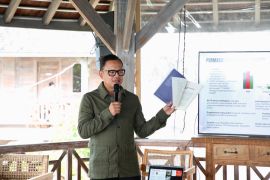"The ORI must be initiated by the head of state; if the head of stated started it himself, the program can be completed in six months," Pulungan told a press conference in Jakarta on Monday.
Pulungan cited the Measles Rubella (MR) immunization as an example, where the president took part and the handling of fake vaccine, which was completed quickly, following the instruction of the head of state.
Therefore, the IDAI chairman expected Jokowi to participate in the diphtheria immunization program, so that the implementation will run quickly.
Moreover, diphtheria cases continue to grow. The Indonesian Medical Association (IDI) data indicated that diphtheria cases are found in 142 districts in 28 provinces throughout Indonesia, with over 600 patients being hospitalized and 40 deaths.
He explained that until now, the coverage of ORI, which began to be implemented on Dec 11, 2017, is still far from expectation. "In West Java, it has not reached 20 percent," Pulungan stated.
In addition, vacations have started for school children from today, so that the implementation of ORI is not done in school anymore.
The IDAI chief opined that if the ORI program is only carried out at public health care centers (puskesmas), it would be less effective because it depends on the awareness of the community who brought their children to the health facility.
Meanwhile, the Governor of Jakarta, Anies Baswedan, conducted ORI simultaneously in 33 senior high schools in West Jakarta on Monday.
The ORI program is conducted with a cross-sectoral cooperation involving the Social Service, Neighborhood (RT), RW, and Health Cadre.
The target of ORI is to immunize 1,238,283 inhabitants in North Jakarta and West Jakarta, totaling 1,238,283 inhabitants. ORI is done in all kindergartens, early childhood centers, primary / junior high schools, and universities. It is also done in health facilities, hospitals, and other locations such as daycare facilities, apartments, and flats.
Diphtheria is particularly dangerous if the patient is treated 2-3 days after contracting the disease. If a patient has a cough for more than two weeks, it is possible that he or she is at high risk, he remarked.
(A014/INE)
EDITED BY INE/H-YH
(T.A014/A/KR-BSR/A/H-YH)
Reporter: antara
Editor: Heru Purwanto
Copyright © ANTARA 2017












